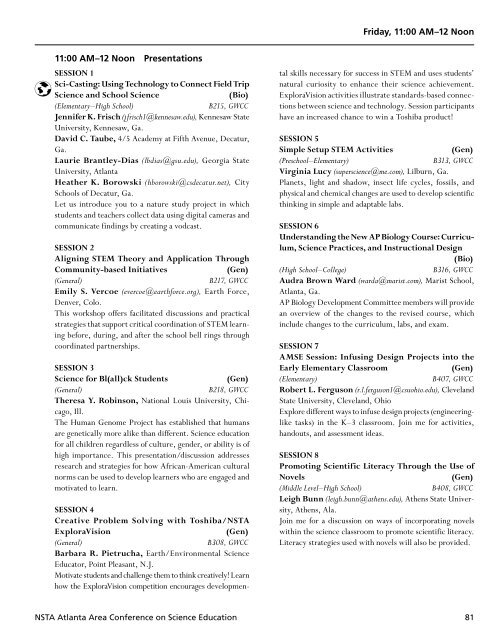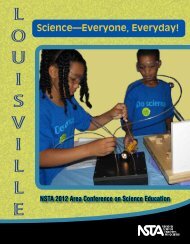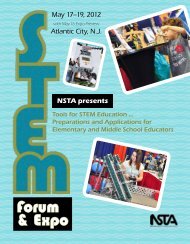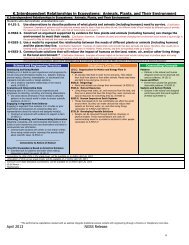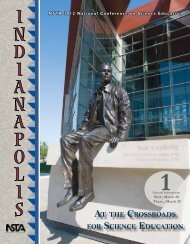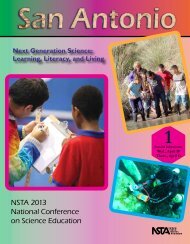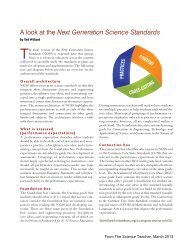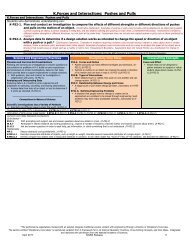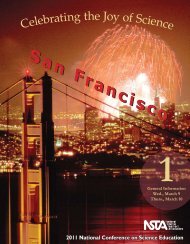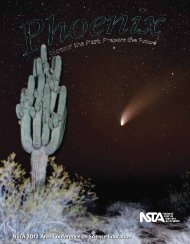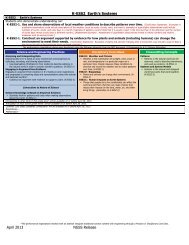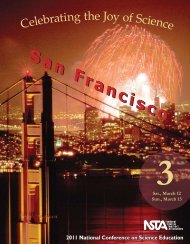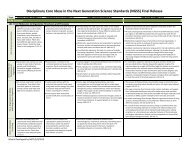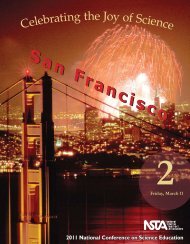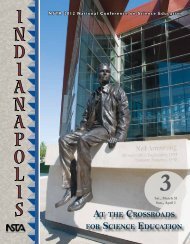Atlanta Conference Program
Atlanta Conference Program
Atlanta Conference Program
You also want an ePaper? Increase the reach of your titles
YUMPU automatically turns print PDFs into web optimized ePapers that Google loves.
Friday, 11:00 AM–12 Noon<br />
p<br />
11:00 AM–12 Noon Presentations<br />
SESSION 1<br />
Sci-Casting: Using Technology to Connect Field Trip<br />
Science and School Science<br />
(Bio)<br />
(Elementary–High School)<br />
B215, GWCC<br />
Jennifer K. Frisch (jfrisch1@kennesaw.edu), Kennesaw State<br />
University, Kennesaw, Ga.<br />
David C. Taube, 4/5 Academy at Fifth Avenue, Decatur,<br />
Ga.<br />
Laurie Brantley-Dias (lbdias@gsu.edu), Georgia State<br />
University, <strong>Atlanta</strong><br />
Heather K. Borowski (hborowski@csdecatur.net), City<br />
Schools of Decatur, Ga.<br />
Let us introduce you to a nature study project in which<br />
students and teachers collect data using digital cameras and<br />
communicate findings by creating a vodcast.<br />
SESSION 2<br />
Aligning STEM Theory and Application Through<br />
Community-based Initiatives<br />
(Gen)<br />
(General)<br />
B217, GWCC<br />
Emily S. Vercoe (evercoe@earthforce.org), Earth Force,<br />
Denver, Colo.<br />
This workshop offers facilitated discussions and practical<br />
strategies that support critical coordination of STEM learning<br />
before, during, and after the school bell rings through<br />
coordinated partnerships.<br />
SESSION 3<br />
Science for Bl(all)ck Students<br />
(Gen)<br />
(General)<br />
B218, GWCC<br />
Theresa Y. Robinson, National Louis University, Chicago,<br />
Ill.<br />
The Human Genome Project has established that humans<br />
are genetically more alike than different. Science education<br />
for all children regardless of culture, gender, or ability is of<br />
high importance. This presentation/discussion addresses<br />
research and strategies for how African-American cultural<br />
norms can be used to develop learners who are engaged and<br />
motivated to learn.<br />
SESSION 4<br />
Creative Problem Solving with Toshiba/NSTA<br />
ExploraVision<br />
(Gen)<br />
(General)<br />
B308, GWCC<br />
Barbara R. Pietrucha, Earth/Environmental Science<br />
Educator, Point Pleasant, N.J.<br />
Motivate students and challenge them to think creatively! Learn<br />
how the ExploraVision competition encourages developmental<br />
skills necessary for success in STEM and uses students’<br />
natural curiosity to enhance their science achievement.<br />
ExploraVision activities illustrate standards-based connections<br />
between science and technology. Session participants<br />
have an increased chance to win a Toshiba product!<br />
SESSION 5<br />
Simple Setup STEM Activities<br />
(Gen)<br />
(Preschool–Elementary)<br />
B313, GWCC<br />
Virginia Lucy (superscience@me.com), Lilburn, Ga.<br />
Planets, light and shadow, insect life cycles, fossils, and<br />
physical and chemical changes are used to develop scientific<br />
thinking in simple and adaptable labs.<br />
SESSION 6<br />
Understanding the New AP Biology Course: Curriculum,<br />
Science Practices, and Instructional Design<br />
(Bio)<br />
(High School–College)<br />
B316, GWCC<br />
Audra Brown Ward (warda@marist.com), Marist School,<br />
<strong>Atlanta</strong>, Ga.<br />
AP Biology Development Committee members will provide<br />
an overview of the changes to the revised course, which<br />
include changes to the curriculum, labs, and exam.<br />
SESSION 7<br />
AMSE Session: Infusing Design Projects into the<br />
Early Elementary Classroom<br />
(Gen)<br />
(Elementary)<br />
B407, GWCC<br />
Robert L. Ferguson (r.l.ferguson1@csuohio.edu), Cleveland<br />
State University, Cleveland, Ohio<br />
Explore different ways to infuse design projects (engineeringlike<br />
tasks) in the K–3 classroom. Join me for activities,<br />
handouts, and assessment ideas.<br />
SESSION 8<br />
Promoting Scientific Literacy Through the Use of<br />
Novels<br />
(Gen)<br />
(Middle Level–High School)<br />
B408, GWCC<br />
Leigh Bunn (leigh.bunn@athens.edu), Athens State University,<br />
Athens, Ala.<br />
Join me for a discussion on ways of incorporating novels<br />
within the science classroom to promote scientific literacy.<br />
Literacy strategies used with novels will also be provided.<br />
NSTA <strong>Atlanta</strong> Area <strong>Conference</strong> on Science Education<br />
81


